 Giving things away freely – time, knowledge, possessions and money – has been and continues to be a truly valuable aspect of my freedom. My grandmother was a big inspiration. She lived simply yet, in the last years of her life, if you commented appreciatively about any item in her house she would suggest you take it. In part, her ‘gifting’ inspired my belief in the maxim: ‘from each according to their abilities, to each according to their needs’ – which, for me, is less ideology and more common sense logic for abundant living in a world of largely finite resources.
Giving things away freely – time, knowledge, possessions and money – has been and continues to be a truly valuable aspect of my freedom. My grandmother was a big inspiration. She lived simply yet, in the last years of her life, if you commented appreciatively about any item in her house she would suggest you take it. In part, her ‘gifting’ inspired my belief in the maxim: ‘from each according to their abilities, to each according to their needs’ – which, for me, is less ideology and more common sense logic for abundant living in a world of largely finite resources.
Interest in the wondrous wisdom of gift economics appears to be returning: from online platforms such as Ziilch, Justfortheloveofit and Freecycle (the latter has ensured 4.5 million tonnes of waste stays out of landfills through a simple advertisement-based mode of exchange), to a wide range of on-the-ground gifting practices and huge support for the stimulating thoughts of Charles Eisenstein, amongst others.
And whilst interest is returning in many ways, in other ways it never left; Mali, for example, maintains a gift culture. Somewhat differently, I have read that the first words the Amish will often use when arriving at a neighbour’s house are not ‘how are you?’ but ‘what can I do?’ And, of course, nature is a wonderful gift economy from which we receive, every single moment.
 A method of gifting that universally brings a smile to the face is the ‘pay it forward’ model (global pay it forward day is April 25th). Yet, money is such a powerful drug and scarcity thinking so pervasive, how might people respond to an international day where people are encouraged to give their own money, or some equivalent, to complete strangers, asking them to pay half of this forward?
A method of gifting that universally brings a smile to the face is the ‘pay it forward’ model (global pay it forward day is April 25th). Yet, money is such a powerful drug and scarcity thinking so pervasive, how might people respond to an international day where people are encouraged to give their own money, or some equivalent, to complete strangers, asking them to pay half of this forward?
On 15 September 2012, Free Money Day was held for the second time, with 138 events across 24 countries including Nigeria, Thailand, Argentina, Russia and New Zealand. Over 50 events were held in the U.S. alone. As organisers, we at the Post Growth Institute were so excited (and sometimes intrigued) by the widespread coverage we received this year, notably including: the Huffington Post; Toronto Star; The Journal; Good; Stephen Fry; and Rabobank!
A full range of photos can be found on Flickr, videos on YouTube and we had a particularly nice interview with Bondi Locals Radio in Sydney, Australia.
People became really creative with the Free Money Day concept. In Moerewa, New Zealand, buskers Emma and Derek handed out money to people listening to their music. Gonçalo’s video store in Lisbon, Portugal, gave free movie rentals and asked recipients to give to others in the street the money they would have spent. Similarly, Brian left $30 on ‘the tab’ at the Flying Hat Coffee Shop in Portland, U.S.A, with notes for customers saying: “this coffee has already been paid for. Consider yourself gifted… We encourage you to give away the money you would’ve spent on this coffee to a complete stranger”. At Hamimi, in Brisbane, Australia, staff gave away their own money to customers all day in memory of their late brother Andrew ‘Wilf’ Wilford who was involved in the inaugural Free Money Day.
And one couple pledged to give away $30,000 of property in Thailand to a community land trust! (the first two farmers have since been invited to live on the land).
In terms of other ideas on how to give to strangers, Rick in Wisconsin, U.S.A, put a money-filled bucket and ‘for the taking’ sign on the street for passers-by; Eric in Bristol, U.K., left a ten pound note on a toilet seat, tweeting that it was the: ‘happiest shit someone will ever have!’
In addition to money, Carol in Norway handed out free reading books. In the Pyrenees, France, Sally paid for the people behind her to enter the national park. In Cardiff, Wales, Justin and friends from Positive Money and other groups held a ‘skills auction’, where artists, musicians, technicians, filmmakers and web designers donated their skills and time, and people bid to have access to these skills. The proceeds were then used to hand out free money! In Kenya, Joseph and friends held circle discussions about the concept, whilst in New York, Joanne also shared conversations about money with her 11th grade students.
The main words used to describe the 2012 Free Money Day were ‘fun’, ‘apprehension’ and ‘appreciation’.
Many participants shared how fun it was to give away their own money – particularly when it was warmly received. 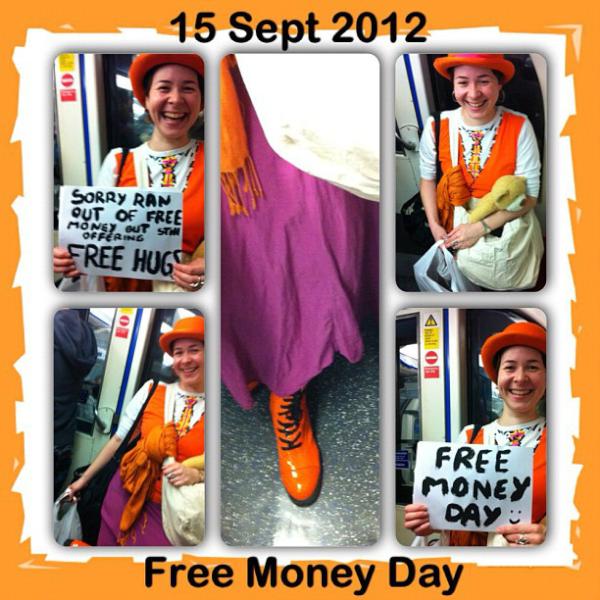 In Utah, Roger handed out two $1 bills to each of his IHOP restaurant co-workers in their break room, saying: “your mission, if you choose to accept it, is to keep one and give the other to someone else.” The result: “it sparked a lot of fun discussion and it felt great to be charitable”. Robyn, on Australia’s east coast, dropped money into people’s gardens and was delighted to read on her friend’s Facebook page that it had “been raining money and that he kept finding $5 notes in his yard”. Cila’s Free Money Day at Liverpool Station in London, U.K., stemmed from incredible serendipity. Suzanne made this creative video of her fun experience handing out money in a park in Charlotte, U.S.A. On the United States’ west coast, things got contagious in San Francisco, with a member of the public taking up Caterina’s offer to see what it felt like to hand money to strangers. In Washington D.C. where I and two others handed out close to $600, some people were ecstatic; literally jumping around. At one stage, word must have got out to the neighbourhood, because people came running in from all over, smiles beaming. Yet, rather than just wanting ‘free money’, many people wanted to hang around and chat.
In Utah, Roger handed out two $1 bills to each of his IHOP restaurant co-workers in their break room, saying: “your mission, if you choose to accept it, is to keep one and give the other to someone else.” The result: “it sparked a lot of fun discussion and it felt great to be charitable”. Robyn, on Australia’s east coast, dropped money into people’s gardens and was delighted to read on her friend’s Facebook page that it had “been raining money and that he kept finding $5 notes in his yard”. Cila’s Free Money Day at Liverpool Station in London, U.K., stemmed from incredible serendipity. Suzanne made this creative video of her fun experience handing out money in a park in Charlotte, U.S.A. On the United States’ west coast, things got contagious in San Francisco, with a member of the public taking up Caterina’s offer to see what it felt like to hand money to strangers. In Washington D.C. where I and two others handed out close to $600, some people were ecstatic; literally jumping around. At one stage, word must have got out to the neighbourhood, because people came running in from all over, smiles beaming. Yet, rather than just wanting ‘free money’, many people wanted to hang around and chat.
As in 2011, a number of people handing out money commented on the unexpected level of apprehension from strangers. It took Alix over an hour to give away $20 dollars in San Francisco; she regularly gives free hugs and found people were more skeptical of money. Brian, in Portland, U.S.A., had a similar experience:
It has been strange to know how well-intentioned we are, and to realize most of our work is overcoming people’s skepticism that this is some sort of scam…Portland prides itself on its eccentricity. We have done a great job pushing social norms about fashion and ‘normal.’ One night a group of naked bikers pulled up right next to my outdoor dinner table…but people around me weren’t nearly as unsettled as they were with this…some random person coming up to them to give them money…it really makes you think about how ingrained our relationship to money is, even in a progressive place like this…
Brian, Portland, U.S.A.
On a deeper level, perhaps there is something to learn from the response Alix received in San Francisco, that “nothing is ever free”. After one particularly challenging experience in Portland, Brian realised that “…in actuality, I was expecting that the other person be excited or maybe even thankful in return…I wanted the recognition…”. In this sense, a number of people commented that reflecting on the challenges they faced handing out money was important for their own journey.
One sad soul took the money, insulted me, was aggravated that his picture was taken and after we deleted the photo told us he would take the money and not share it at all. I probably got the most out of the worst experience. That person let me understand gratitude as something to experience from the inside, not the outside. I thought I understood this before, but I feel it more now.
Gail, Hilo, Hawaii
In terms of reducing unnecessary apprehension, we learnt three main things. Firstly, having more than one person handing out money at the same location is less intimidating for all involved. Secondly, that physical proximity matters – people were more likely to engage when spoken to within a radius of no more than 2 metres; beyond this distance, the raised voice perhaps lends itself to fear someone is selling something. And thirdly, mentioning in a non-instructive way to people who might at first wave you away that they ‘might like to pass half on’, seems to draw in a number of perhaps otherwise unlikely participants.
Beyond any initial mistrust and rejection (“I don’t need it”), participants commonly exposed a deep appreciation. Mary in Phoenix said she: “…gave $2 each to the fellows behind the desk at the Pueblo Grande Museum in Phoenix. They just stared at me at first, but then when they realized I wasn’t kidding, they thanked me. One fellow said, “Two lucky visitors will get money today – I’m giving both of mine away””. At least two people we met in Washington, D.C., said their somewhat depressing morning was entirely transformed as a result of being part of Free Money Day. Barbara sent us through this lovely message on Twitter: “Thank you for entering my silly heart & spirit. Now you have touched a corner of each FOREVER!” And we received this inspiring message from Bayo in Nigeria:
As our global landscapes experience unprecedented seismic disturbances, my wife, Ej, and I have often wondered about how best we can transit into the life our hearts tell us is possible – into a world in which time and space are not commoditised properties of the industrial complex. Our disenchantment inspired us to initiate the Koru project, but we needed some sort of ritual to loosen us from the strongholds of our dying civilization. You can understand our excitement when we learned of ‘Free Money Day’…To us, the day represented a re-enchantment of the sacredness of gifts and our shared selfhood – a way to resuscitate the wealth of togetherness, the lack of which has severely impoverished the world and our imagination… The Day inspired us to connect with others, to see ourselves as conduits of the universe’s bountiful wealth, to realize that we are songs that the impeded stream sings. Ej bakes great cakes, and we are finding ways to share them with those around us! Free Money Day helped us realize that a new world is not merely possible on the pages of a skilled wordsmith, but on the streets of our aching cities, in-between the exchanges of supposed strangers, and through the visions of the many and the few.
Bayo, Abuja, Nigeria
This glimpse from Patrick of what happened in Montreal, Canada: “acute conversations, meaningful comments and beautiful spontaneity lit up the usual vibe those sidewalks host”. Matt Jones in Sydney, Australia, spent time handing money out to members of the Korean community, had a wonderful interaction with these three men, and saw moods lifted generally through generosity. On this note, Gail in Hilo, Hawaii, said at least one person she gave money to was “…pretty much a street person who handed half to another immediately and there was a chorus of ‘praise of the Lord!’”. For Ollie in Lund, Sweden, the experience was transformative:
I had my doubts about Free Money Day (I didn’t quite see the point of handing out money to complete strangers in a western country when those whom I would be handing it out to didn’t really need it) right up to the time when I handed across my first 10 Swedish Kroner (in two 5 kr coins) to a stranger at a potluck dinner…Following initial apprehension, the recipient was so excited and the process continued all night long…I felt like I was helping people take a blindfold off their eyes that neither they or I knew was there…by publicly showing that we can approach money not as something to hoard but as something to share, I really feel I helped people to unlock its full potential and embrace the power of paying it forward.
Ollie, Lund, Sweden
 On the whole, younger people were particularly appreciative of the Free Money Day philosophies and experience. Here are Louise’s kids preparing for Free Money Day in Eastbourne, U.K.
On the whole, younger people were particularly appreciative of the Free Money Day philosophies and experience. Here are Louise’s kids preparing for Free Money Day in Eastbourne, U.K.
In Gisborne, New Zealand, Manu gave coins to neighbourhood kids “…on the condition they gave half of it to someone else” which they did, to his surprise.
And we just loved our youngest ambassadors, Max and Kayla, ‘giving money back to the world’:
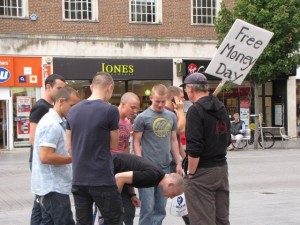 At Ghee’s event in Exeter, U.K., one bunch of young men were so amused, they actually all put money in rather than take it out. Together, they talked about greed versus generosity; how much is enough; and why some humans find it hard to trust a person giving something away with ‘no catch to it’.
At Ghee’s event in Exeter, U.K., one bunch of young men were so amused, they actually all put money in rather than take it out. Together, they talked about greed versus generosity; how much is enough; and why some humans find it hard to trust a person giving something away with ‘no catch to it’.
Karen in Amherst, U.S.A, found young people the least suspicious, although Kate, who handed out coins at a private school fete in Sydney, found teenage boys both suspicious and dismissive!
As an organiser, I also appreciated discovering other likeminded initiatives through the course of this event. These included the free 5 Euros experiment in Ireland, 2011, Art in odd places (maintained by @moneyactions), Yerdle – a soon to be launched gifting economy, and OuiShare – a collaborative economy community in Europe.
In 2013, we’ll be looking to improve the experience through a more interactive web platform, earlier promotions, and translations of the site and materials from English to multiple languages. We will be encouraging the pledging of gifts beyond money, and exploring a partnership for online gifting with Pygg.
For all our wonderful participants, or readers seeking to create ripples on limited budgets (and lots of voluntary hard work), you might be inspired to know that Free Money Day, as a global event, was organized on a budget of US $120!
When I gift, I rebuild trust. When I share, I delight in life’s joys whilst respecting the differences that make our interactive journeys meaningful. But, for mine, the real value of money for nothing surrounds the sharing of love. As Mark Boyle, the money-less man, so eloquently puts it: “…if you spend your time putting more love into the world, then it is reasonable to believe you are going to benefit from a world with more love in it”.
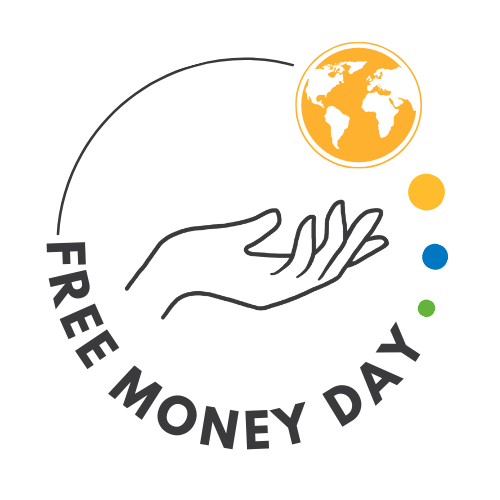
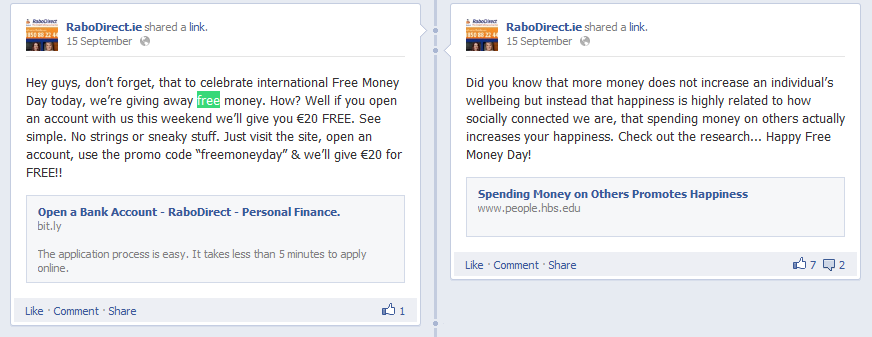
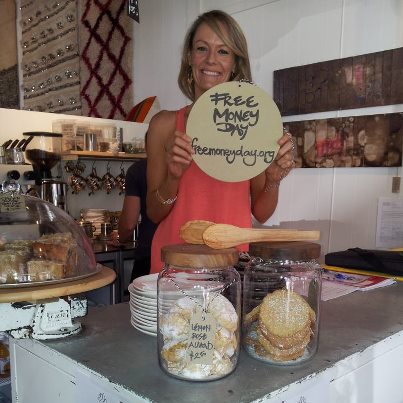
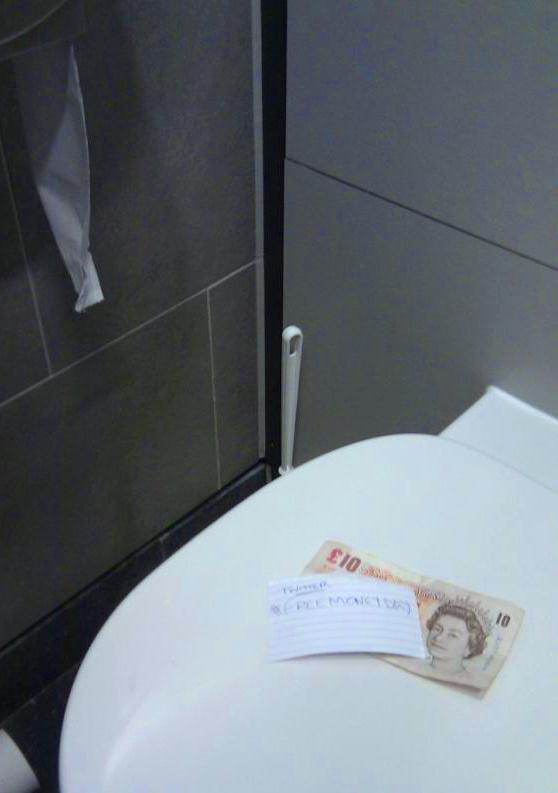
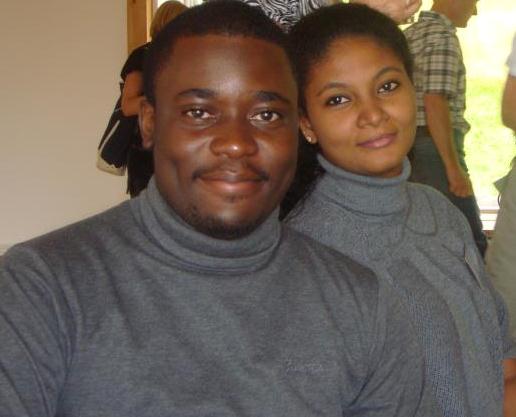 As our global landscapes experience unprecedented seismic disturbances, my wife, Ej, and I have often wondered about how best we can transit into the life our hearts tell us is possible – into a world in which time and space are not commoditised properties of the industrial complex. Our disenchantment inspired us to initiate the Koru project, but we needed some sort of ritual to loosen us from the strongholds of our dying civilization. You can understand our excitement when we learned of ‘Free Money Day’…To us, the day represented a re-enchantment of the sacredness of gifts and our shared selfhood – a way to resuscitate the wealth of togetherness, the lack of which has severely impoverished the world and our imagination… The Day inspired us to connect with others, to see ourselves as conduits of the universe’s bountiful wealth, to realize that we are songs that the impeded stream sings. Ej bakes great cakes, and we are finding ways to share them with those around us! Free Money Day helped us realize that a new world is not merely possible on the pages of a skilled wordsmith, but on the streets of our aching cities, in-between the exchanges of supposed strangers, and through the visions of the many and the few.
As our global landscapes experience unprecedented seismic disturbances, my wife, Ej, and I have often wondered about how best we can transit into the life our hearts tell us is possible – into a world in which time and space are not commoditised properties of the industrial complex. Our disenchantment inspired us to initiate the Koru project, but we needed some sort of ritual to loosen us from the strongholds of our dying civilization. You can understand our excitement when we learned of ‘Free Money Day’…To us, the day represented a re-enchantment of the sacredness of gifts and our shared selfhood – a way to resuscitate the wealth of togetherness, the lack of which has severely impoverished the world and our imagination… The Day inspired us to connect with others, to see ourselves as conduits of the universe’s bountiful wealth, to realize that we are songs that the impeded stream sings. Ej bakes great cakes, and we are finding ways to share them with those around us! Free Money Day helped us realize that a new world is not merely possible on the pages of a skilled wordsmith, but on the streets of our aching cities, in-between the exchanges of supposed strangers, and through the visions of the many and the few.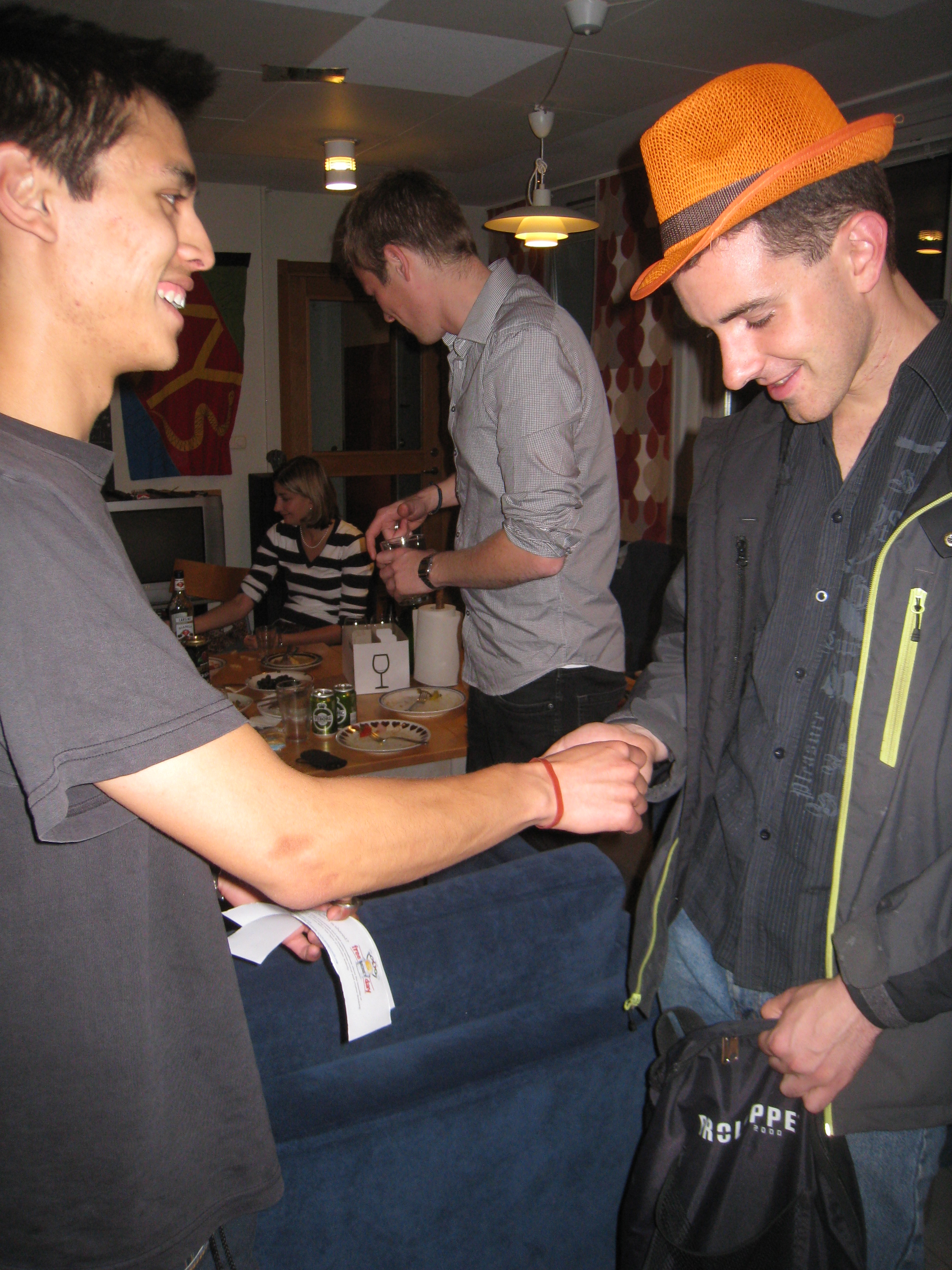 I had my doubts about Free Money Day (I didn’t quite see the point of handing out money to complete strangers in a western country when those whom I would be handing it out to didn’t really need it) right up to the time when I handed across my first 10 Swedish Kroner (in two 5 kr coins) to a stranger at a potluck dinner…Following initial apprehension, the recipient was so excited and the process continued all night long…I felt like I was helping people take a blindfold off their eyes that neither they or I knew was there…by publicly showing that we can approach money not as something to hoard but as something to share, I really feel I helped people to unlock its full potential and embrace the power of paying it forward.
I had my doubts about Free Money Day (I didn’t quite see the point of handing out money to complete strangers in a western country when those whom I would be handing it out to didn’t really need it) right up to the time when I handed across my first 10 Swedish Kroner (in two 5 kr coins) to a stranger at a potluck dinner…Following initial apprehension, the recipient was so excited and the process continued all night long…I felt like I was helping people take a blindfold off their eyes that neither they or I knew was there…by publicly showing that we can approach money not as something to hoard but as something to share, I really feel I helped people to unlock its full potential and embrace the power of paying it forward.
Donnie,
Thanks for bringing this to my attention. I am looking forward to implementing this in my area.
Merri (Byron Bay, Economics of Happiness workshop)
Pay it forward is always a great thing. Giving to others is invaluable when you give from the heart. To experience it first hand, it is very rewarding. I like the above, "many participants shared how fun it was to give away their own money – particularly when it was warmly received. Truly appreciate the work of Free Money Day. Thanks for sharing!
Thanks for your support Jacklyn!